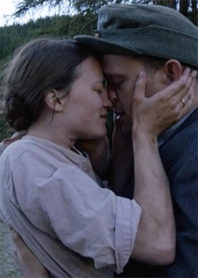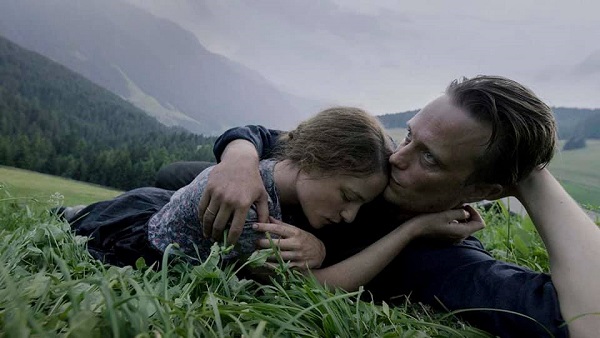
Franz Jagerstatter (August Diehl) is a farmer from Radegund, Austria during the 1940s. He was like most men from that region and that time. He received basic military training to eventually become a private of the Wermacht. Part of this training involves watching footage of the air force turning cities into rubble. Their supervisors’ aim in showing this film is to rouse a nationalistic sentiment within these boys and men. The Third Reich spreads their victory beyond their borders! Most of the men watch the film with silent consent. But Franz sees these images as a sign that his country is becoming morally corrupt. After his training, he tells the government that they need him more as a farmer. That way, they don’t deploy him to the front lines. So that he won’t be complicit in acts that he, and eventually history, sees as atrocities against other human beings.
That’s the basic premise for Terrence Malick’s A Hidden Life. Other critics have called this a return to form for him. I chalk up the divisive reception he received for his past three movies to his cringe worthy embrace of modernity. Perhaps critics like this film more because this is the one where he shuns modernity. Here, modernity manifests itself as political ideology and all of its symbols. Politics is an intrusion against the farmland utopia where Franz has no worries. Where he hangs out with fellow townsfolk in beer halls. Where he and his wife Fani (Valerie Pachner) recount their memories of lovingly gazing at each other. Franz’ ideal life is an apolitical one where he and Fani only exist.
And there’s a beautiful craftsmanship with the way Malick depicts these intrusions in Franz and Fani’s life. They can hide in the mountains all they want but the Wermacht’s planes can still reach them. A peaceful walk comes with its interruptions. A bike messenger with the smallest Swastika pin is noticeable both to them and to the audience. Those messengers’ presence are more disturbing when they get younger and younger, oblivious to the system they’re complicit to. Other complicit parties include members of older generations, active in spewing hateful ideology that Franz has never heard before. Malick requires Diehl and Pachner to be physical during their characters’ emotional extremes. But they’re at their best in these moments when they’re in silent shock to dogs of war barking at them.
Franz and Fani aren’t always silent though. Either through narration or through actual conversations, Franz gets to dissent against this outside ideology. He even detects that men his generation have the same opinions. Again, I’m buying most of Malick’s ideas about this country, this man, and this war. Malick idealizes at least the man and the country. And that idealization can come across as naïve and even privileged. The politics of say, the mayor (Karl Markovics) surprises Franz. And that’s because the latter isn’t part of minority groups. He’s not on the receiving end of the mayor’s hatred, at least not until he becomes a conscientious objector. Malick’s directs the conversations between both characters as if they’re trying to compromise. This is something people do to others if they’re not strangers. But the tone, again, feels naïve.
Nonetheless, it’s still striking to hear and see lawyers (Matthias Schoenaerts) and judges (Bruno Ganz) speak to Franz. They tell him that his act of defiance is insignificant. That no one in history will remember him, one conscientious objector in comparison to millions who obeyed Hitler’s will. They say these words to him on hollowed places like churches and courtrooms. They have the audacity to stain those walls with corruption. Malick shoots those scenes to reinforce Franz’s alienation. But Franz Jagerstatter was a real person, and history eventually revealed parts of his story throughout the years. History will again forget him and us faster than crueler men who don’t deserve our collective memory. But his victory is personal. And in showing his story, Malick encourages us that clear consciences matter and deserve cinematic consideration.
For more information on A Hidden Life go to https://www.cineplex.com/Movie/a-hidden-life.
- Release Date: 12/20/2019


